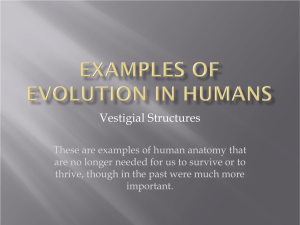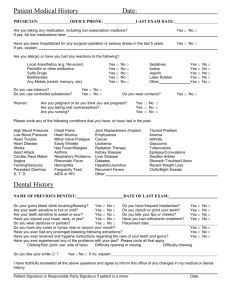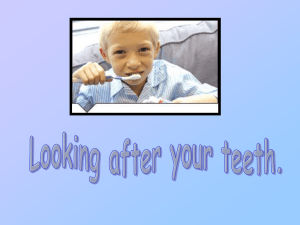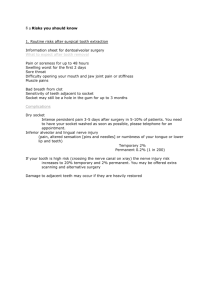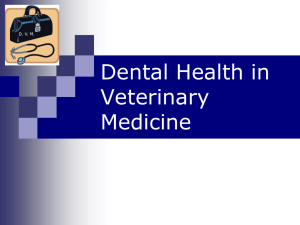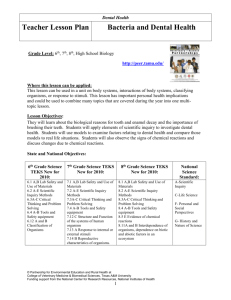Dental DNA - South Point Dental Center
advertisement
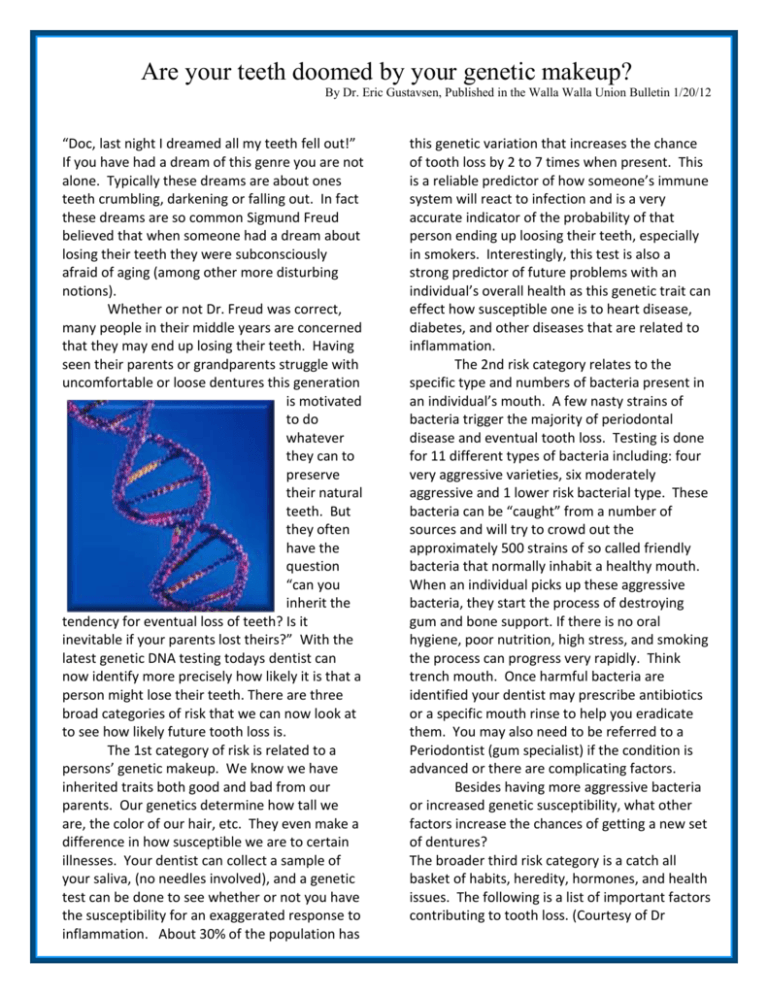
Are your teeth doomed by your genetic makeup? By Dr. Eric Gustavsen, Published in the Walla Walla Union Bulletin 1/20/12 “Doc, last night I dreamed all my teeth fell out!” If you have had a dream of this genre you are not alone. Typically these dreams are about ones teeth crumbling, darkening or falling out. In fact these dreams are so common Sigmund Freud believed that when someone had a dream about losing their teeth they were subconsciously afraid of aging (among other more disturbing notions). Whether or not Dr. Freud was correct, many people in their middle years are concerned that they may end up losing their teeth. Having seen their parents or grandparents struggle with uncomfortable or loose dentures this generation is motivated to do whatever they can to preserve their natural teeth. But they often have the question “can you inherit the tendency for eventual loss of teeth? Is it inevitable if your parents lost theirs?” With the latest genetic DNA testing todays dentist can now identify more precisely how likely it is that a person might lose their teeth. There are three broad categories of risk that we can now look at to see how likely future tooth loss is. The 1st category of risk is related to a persons’ genetic makeup. We know we have inherited traits both good and bad from our parents. Our genetics determine how tall we are, the color of our hair, etc. They even make a difference in how susceptible we are to certain illnesses. Your dentist can collect a sample of your saliva, (no needles involved), and a genetic test can be done to see whether or not you have the susceptibility for an exaggerated response to inflammation. About 30% of the population has this genetic variation that increases the chance of tooth loss by 2 to 7 times when present. This is a reliable predictor of how someone’s immune system will react to infection and is a very accurate indicator of the probability of that person ending up loosing their teeth, especially in smokers. Interestingly, this test is also a strong predictor of future problems with an individual’s overall health as this genetic trait can effect how susceptible one is to heart disease, diabetes, and other diseases that are related to inflammation. The 2nd risk category relates to the specific type and numbers of bacteria present in an individual’s mouth. A few nasty strains of bacteria trigger the majority of periodontal disease and eventual tooth loss. Testing is done for 11 different types of bacteria including: four very aggressive varieties, six moderately aggressive and 1 lower risk bacterial type. These bacteria can be “caught” from a number of sources and will try to crowd out the approximately 500 strains of so called friendly bacteria that normally inhabit a healthy mouth. When an individual picks up these aggressive bacteria, they start the process of destroying gum and bone support. If there is no oral hygiene, poor nutrition, high stress, and smoking the process can progress very rapidly. Think trench mouth. Once harmful bacteria are identified your dentist may prescribe antibiotics or a specific mouth rinse to help you eradicate them. You may also need to be referred to a Periodontist (gum specialist) if the condition is advanced or there are complicating factors. Besides having more aggressive bacteria or increased genetic susceptibility, what other factors increase the chances of getting a new set of dentures? The broader third risk category is a catch all basket of habits, heredity, hormones, and health issues. The following is a list of important factors contributing to tooth loss. (Courtesy of Dr Richard H. Nagelburg) Current research places the first six as the most reliable predictors. Heredity/Family History Smoking Diabetes Ethnicity History of Periodontal disease Poor oral hygiene Medications Leaking dental restorations Hormonal variations Suppressed immune system Exposure to aggressive bacteria Nutrition If worrying about your teeth is disturbing your sleep ask your dentist to run the Oral DNA lab test (www.OralDNA.com). This will determine whether or not you have the genetic susceptibility for tooth loss and determine the variety of bacteria you may have come in contact with. She/he will also be happy to give advice on how to manage any other risk factors so you can enjoy your own teeth for life. Sweet dreams.

